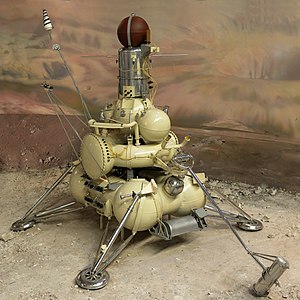Kosmos 300
 A Ye-8-5 model in the Museum of Cosmonautics, Moscow. | |
| Mission type | Lunar sample-return |
|---|---|
| Operator | Soviet space program |
| COSPAR ID | 1969-080A |
| SATCAT no. | 4104 |
| Mission duration | 4 days |
| Spacecraft properties | |
| Spacecraft type | Ye-8-5 |
| Manufacturer | GSMZ Lavochkin |
| Launch mass | 5,600 kg (12,300 lb)[1] |
| Start of mission | |
| Launch date | September 23, 1969, 14:07:00 UTC[2] |
| Rocket | Proton-K/D |
| Launch site | Baikonur 81/24 |
| End of mission | |
| Disposal | Launch failure |
| Decay date | September 27, 1969 |
| Orbital parameters | |
| Reference system | Geocentric[2] |
| Perigee altitude | 184 km (114 mi) |
| Apogee altitude | 189 km (117 mi) |
| Inclination | 51.5° |
| Period | 88.2 min |
Kosmos 300 (Russian: Космос 300 meaning Cosmos 300) (Ye-8-5 series) was the fourth Soviet attempt at an uncrewed lunar sample return. It was probably similar in design to the later Luna 16 spacecraft. It was launched, on a Proton rocket, on September 23, 1969.[3] The mission was a failure. The engines on the Block D upper stage failed due to an oxidizer leak, leaving the spacecraft to burn up in Earth's atmosphere.[4]
References
- ^ "Cosmos 300". nssdc.gsfc.nasa.gov. NASA. Retrieved 25 May 2024.
- ^ a b Mark Wade. "Luna Ye-8-5". Encyclopedia Astronautica. Retrieved 25 May 2024.
- ^ "Luna - Exploring the Moon". orbitalfocus.uk. Retrieved 23 February 2023.
- ^ Asif Siddiqi (2018). Beyond Earth: A Chronicle of Deep Space Exploration, 1958–2016 (PDF) (second ed.). NASA History Program Office. p. 92. ISBN 978-1-626-83043-1.
